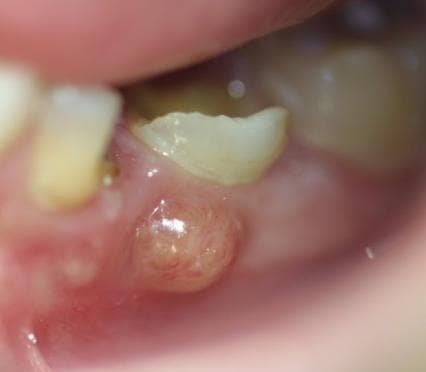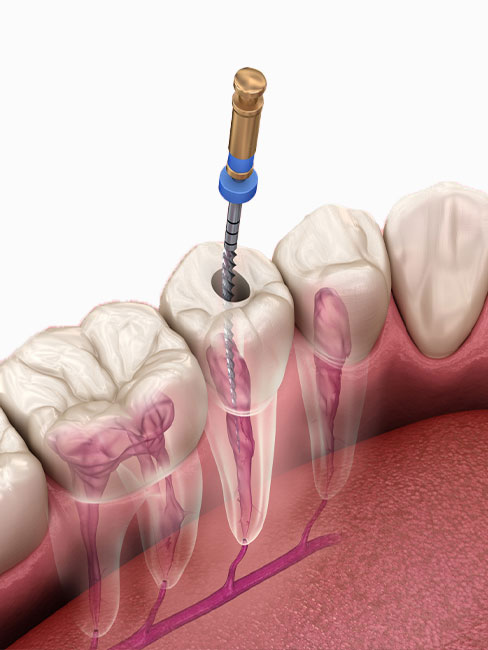Dental crowns cover and protect natural teeth that are weak or damaged. So, you wouldn’t expect them to give you any problems. It’s true that right after the permanent crowns are fitted, you might experience some pain and temporary discomfort in the first few weeks. But after that, it will start to get better.
Sometimes, though, that doesn’t happen. In fact, the tooth crown pain keeps getting worse. There are also instances when people develop tooth crown pain years after getting the dental restoration. This pain can be a sign of a more serious problem, which is why you shouldn’t ignore it.
Why Is Your Crowned Tooth Hurting?
A crowned tooth can feel painful due to one or more of the following reasons:
Cavity
Although the crown itself will not get any cavities, the same cannot be said for the tooth beneath it. If you notice a black line at the border between the tooth and the crown, it could mean that the underlying tooth is decaying.
And this can cause significant pain, especially if the tooth wears down to the nerve. This cavity can also end up causing inflammation of the innermost tissue of the tooth – the pulp. It’s because the bacteria have entered the space. If this is left untreated, it will not only cause pain but also permanently damage the pulp.
Of course, you can have cavities due to excessive consumption of sugary foods, poor dental hygiene, mouth dryness, or smoking, among other factors. However, there’s another reason that’s related to the dental restoration itself, and it’s called microleakage.
This occurs when bacteria fill up the space between the tooth and the crown. And this could happen if there’s a large gap at the border between the underlying tooth and the dental restoration. Such gaps can occur or develop due to decay, insufficient cementation or even improper fitting.
Failed Root Canal
Sometimes, patients need to get a root canal before getting a dental crown. It is essentially done to remove the infected tooth pulp at the centre of the tooth. This pulp contains nerves and blood vessels. And certain types of nerves send pain signals to the brain. However, once they’re removed, that doesn’t happen.
So, once the nerves are removed from the tooth canal, you should stop having toothache. But sometimes, even after a root canal, a while after the crown has been fitted, people start experiencing pain. This is usually due to a failed root canal.
It’s possible that your dentist didn’t properly disinfect the tooth, detect or clean its canals, or fill/seal it up. In that case, you’ll still have some bacteria left inside the tooth (along with some nerve tissue), which will end up causing another infection. This will, in turn, cause pain.
Crown Fracture
Trauma or wear and tear can result in the fracture of the dental crown and even the underlying tooth. For instance, the crack in the dental crown can cause sensitivity to hot and cold foods and even air. This can cause both pain and discomfort.
Bruxism
Bruxism is a teeth-grinding disorder in which people unconsciously clench or gnash their teeth. Not only can this damage the natural teeth but also cause pain and sensitivity. Even with a dental crown protecting the underlying tooth, bruxism can cause pain. That’s because of the pressure that you’re putting on the crown.
Gum Disease
Plaque build-up around the teeth can lead to gum disease. It will cause inflammation and recession of the gums. It can even leave the tooth roots exposed, which can cause severe pain. The gum tissue above the dental crown will continue to pull apart from the tooth, which can cause severe pain. This can be exacerbated if you develop an infection or even an abscess.

Malocclusion
Tooth crown pain can also occur if the dental restoration results in a bad bite or malocclusion. This happens if the size of the crown is smaller than the surrounding teeth.
As a result, when you close your mouth, the teeth in the lower and upper jaw will not align with each other. Having uneven pressure distribution will cause some teeth to pick up more weight than others, causing pain and discomfort.
Signs That Your Dental Crown Is Failing
You may need to replace your dental crown if you’re experiencing the following:
- Pain
- Sensitivity
- Gum recession
- Chips and cracks on the crown surface
- Bad breath
- Discolouration of the natural tooth
It’s also important that you keep an eye out for the different signs of infection. That’s because if left untreated, an abscess can be life-threatening. You might experience the following symptoms if you have developed it:
- Intense, throbbing pain that radiates to the ears and neck
- Redness or tenderness around the crown
- Swelling of the jaw and face
- Discomfort
- Sensitivity
- Bitter or salty taste in the mouth
- Drainage
- Difficulty eating
- Fever
If this is happening to you, make sure to get in touch with your doctor as soon as possible.
How To Treat Tooth Crown Pain?
For temporary relief, your dentist might advise you to take painkillers or gargle with salt water rinses/over-the-counter mouthwash with hydrogen peroxide. However, the treatment for tooth crown pain will depend on the root cause of the problem. And it could be any of the following:
Scale and Root Planing
Scaling and root planing is a dental procedure that dislodges the tartar stuck to the teeth above and below the gums. If your crowned tooth is hurting due to gum disease, you might need this treatment.
Root Canal
In case of an unsuccessful root canal, you might need another root canal. In this, the dentist will make sure to get rid of the infected pulp in the canals that remained undetected on the first attempt.

Keep in mind that it’s not always possible to predict the number of canals a tooth has. Sometimes, canals even merge together. Therefore, even skilled dentists fail sometimes due to the complexity of the anatomy.
Also, your dentist may reuse your old crown after the second root canal if it’s not damaged or risks reinfection. If that’s not the case, you’ll need a new dental crown.
Tooth Extraction
A tooth may be too damaged to be treated if the problem has been detected too late. With extensive decay, your dentist may have no option but to extract the entire tooth. In this case, you can consider getting dental implants Turkey to support the crown on top.
Crown Replacement
If you’re having pain because the dental crown is too damaged or doesn’t fit properly, you can simply get it replaced. Keep in mind that dental crowns last anywhere from 10 to 15 years, so you may need to get them replaced eventually.
How To Prevent Tooth Crown Pain?
There are some things that you can do to prevent your crowned tooth from hurting in the first place:
- Good oral hygiene – Even with a dental crown, you need to brush your teeth twice a day and floss. Additionally, make sure that you’re using a soft-bristled toothbrush so that it doesn’t damage your gum tissue.
- Wear a nightguard – If you have teeth grinding disorder, you can consider wearing a night guard while seeking other interventions, such as biofeedback, cognitive behavioural therapy, stress management, etc.
- Eat healthy foods – Hold off on eating foods that are too sugary, as that can cause cavities. Make sure to include vegetables and fruits in your diet. Also, drink lots of water.
- Do not chew hard objects – Try to avoid chewing on hard objects such as pens, pencils, or your nails. This also goes for hard candies and nuts, as they can fracture your crown and cause pain.
Keeping your mouth healthy is the best way to make sure that you don’t have any oral health problems, including crown pain.
Conclusion
You can experience pain for a few weeks to even months once the dental crown is fitted. However, that pain is temporary and should go away on its own. But if that doesn’t happen and your pain continues to get worse, it may be because there’s a problem with your crown or the tooth underneath it.
It’s possible that you’ve developed cavities, infections, or abscesses. On the other hand, your crown might be loose or chipped. Treatment will depend on identifying the underlying cause. And for that, make sure to get in touch with your dentist as soon as possible.
